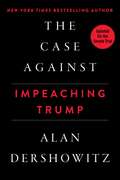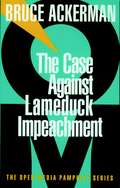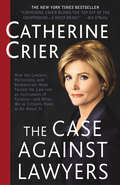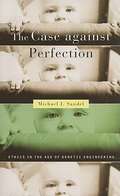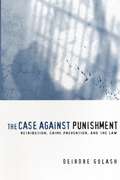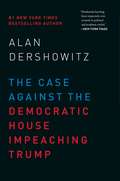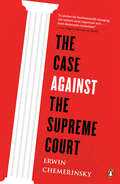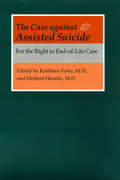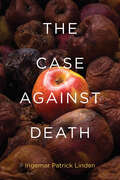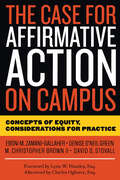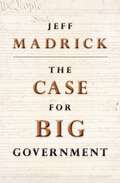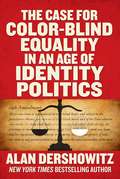- Table View
- List View
The Case Against Free Speech: The First Amendment, Fascism, and the Future of Dissent
by P. E. MoskowitzA hard-hitting expose that shines a light on the powerful conservative forces that have waged a multi-decade battle to hijack the meaning of free speech--and how we can reclaim it.There's a critical debate taking place over one of our most treasured rights: free speech. We argue about whether it's at risk, whether college students fear it, whether neo-Nazis deserve it, and whether the government is adequately upholding it.But as P. E. Moskowitz provocatively shows in The Case Against Free Speech, the term has been defined and redefined to suit those in power, and in recent years, it has been captured by the Right to push their agenda. What's more, our investment in the First Amendment obscures an uncomfortable truth: free speech is impossible in an unequal society where a few corporations and the ultra-wealthy bankroll political movements, millions of voters are disenfranchised, and our government routinely silences critics of racism and capitalism.Weaving together history and reporting from Charlottesville, Skokie, Standing Rock, and the college campuses where student protests made national headlines, Moskowitz argues that these flash points reveal more about the state of our democracy than they do about who is allowed to say what.Our current definition of free speech replicates power while dissuading dissent, but a new ideal is emerging. In this forcefully argued, necessary corrective, Moskowitz makes the case for speech as a tool--for exposing the truth, demanding equality, and fighting for all our civil liberties.
The Case Against Hunger: A Demand for a National Policy
by Ernest F. HollingsSenator Hollings believes that hunger exists in this land, that hunger poses dangers to the nation, and that hunger is costing this country far more in dollars than the most elaborate array of feeding programs.
The Case Against Impeaching Trump
by Alan Dershowitz"Alan Dershowitz is a brilliant lawyer...He has written a new and very important book called The Case Against Impeaching Trump, which I would encourage all people...to read!"—President Donald TrumpThe New York Times bestseller“This brand new book by Professor Dershowitz is absolutely amazing….If you care about justice and the President with the witch hunt, you’re going to want to read this book.”—Sean Hannity “Maybe the question isn’t what happened to Alan Dershowitz. Maybe it’s what happened to everyone else.”—PoliticoAlan Dershowitz has been called “one of the most prominent and consistent defenders of civil liberties in America” by Politico and “the nation’s most peripatetic civil liberties lawyer and one of its most distinguished defenders of individual rights” by Newsweek. Yet he has come under partisan fire for applying those same principles to Donald Trump during the course of his many appearances in national media outlets as an expert resource on civil and constitutional law.The Case Against Impeaching Trump seeks to reorient the debate over impeachment to the same standard that Dershowitz has continued to uphold for decades: the law of the United States of America, as established by the Constitution. In the author’s own words:“In the fervor to impeach President Trump, his political enemies have ignored the text of the Constitution. As a civil libertarian who voted against Trump, I remind those who would impeach him not to run roughshod over a document that has protected us all for two and a quarter centuries. In this case against impeachment, I make arguments similar to those I made against the impeachment of President Bill Clinton (and that I would be making had Hillary Clinton been elected and Republicans were seeking to impeach her). Impeachment and removal of a president are not entirely political decisions by Congress. Every member takes an oath to uphold the Constitution of the United States, and the Constitution sets out specific substantive criteria that MUST be met.I am thrilled to contribute to this important debate and especially that my book will be so quickly available to readers so they can make up their own minds.”
The Case Against Lame Duck Impeachment (Open Media Series)
by Bruce AckermanAn incisive legal argument that the attempt to impeach then-President Bill Clinton was not only ethically troubling, but actually against the basic legal procedures of the House and Senate and thus unconstitutional. A wake-up call, relevant even today, of the lengths to which the American right will go in order to bring down their rivals, even under the scrutinizing eyes of the world.
The Case Against Lawyers: How the Lawyers, Politicians, and Bureaucrats Have Turned the Law into an Instrument of Tyranny--and What We as Citizens Have to Do About It
by Catherine CrierTHE EMMY AWARD-WINNING HOST OF COURT TV’S "CATHERINE CRIER LIVE" DESCRIBES AN AMERICAN LEGAL SYSTEM DANGEROUSLY OUT OF CONTROL – AND FINDS THE LAWYERS GUILTY AS CHARGED.As a child, Catherine Crier was enchanted by film portrayals of crusading lawyers like Clarence Darrow and Atticus Finch. As a district attorney, private lawyer, and judge herself, she saw firsthand how the U.S. justice system worked – and didn’t. One of the most respected legal journalists and commentators today, she now confronts a profoundly unfair legal system that produces results and profits for the few – and paralysis, frustration, and injustice for the many. Alexis de Tocqueville’s dire prediction in Democracy in America has come true: We Americans have ceded our responsibility as citizens to resolve the problems of society to "legal authorities" – and with it our democratic freedoms.The Case Against Lawyers is both an angry indictment and an eloquent plea for a return to common sense. It decries a system of laws so complex even the enforcers – such as the IRS – cannot understand them. It unmasks a litigation-crazed society where billion-dollar judgments mostly line the pockets of personal injury lawyers. It deplores the stupidity of a system of liability that leads to such results as a label on a stroller that warns, “Remove child before folding.” It indicts a criminal justice system that puts minor drug offenders away for life yet allows celebrity murderers to walk free. And it excoriates the sheer corruption of the iron triangle of lawyers, bureaucrats, and politicians who profit mightily from all this inefficiency, injustice, and abuse.The Case Against Lawyers will make readers hopping mad. And it will make them realize that the only response can be to demand change. Now.
The Case Against Owen Williams
by Allan DonaldsonA soldier stationed in rural Canada is accused of murder in this WWII era legal thriller by the acclaimed author of Maclean. New Brunswick, Canada, 1944. Far removed from clamor of World War II, the small town of Wakefield has fallen into the sort of idleness that makes for mischief. But the whole town is shocked when, following a night at The Silver Dollar dance hall, a teenage girl turns up dead in a gravel pit. The last person reported to have seen her is Owen Williams, an introverted soldier stationed with the local garrison of &“Zombies&”—conscripted men unwilling to serve overseas. When Lieutenant Bernard Dorkin, a young lawyer from Saint John, volunteers to defend Williams, whom he believes is innocent, he finds himself up against a bombastic local prosecutor and a public mostly hell-bent on a foregone conclusion. The Case Against Owen Williams explores the potential for wrongful conviction and the gaps in the justice system that allow it to flourish.
The Case Against Perfection: Ethics in the Age of Genetic Engineering
by Michael J. SandelThe Case against Perfection explores these and other moral quandaries connected with the quest to perfect ourselves and our children. Michael Sandel argues that the pursuit of perfection is flawed for reasons that go beyond safety and fairness. The drive to enhance human nature through genetic technologies is objectionable because it represents a bid for mastery and dominion that fails to appreciate the gifted character of human powers and achievements. Carrying us beyond familiar terms of political discourse, this book contends that the genetic revolution will change the way philosophers discuss ethics and will force spiritual questions back onto the political agenda.
The Case Against Punishment: Retribution, Crime Prevention, and the Law
by Deirdre GolashWhat ends do we expect and hope to serve in punishing criminal wrongdoers? Does the punishment of offenders do more harm than good for American society? In The Case against Punishment, Deirdre Golash addresses these and other questions about the value of punishment in contemporary society. Drawing on both empirical evidence and philosophical literature, this book argues that the harm done by punishing criminal offenders is ultimately morally unjustified. Asserting that punishment inflicts both intended and unintended harms on offenders, Golash suggests that crime can be reduced by addressing social problems correlated with high crime rates, such as income inequality and local social disorganization. Punishment may reduce crime, but in so doing, causes a comparable amount of harm to offenders. Instead, Golash suggests, we should address criminal acts through trial, conviction, and compensation to the victim, while also providing the criminal with the opportunity to reconcile with society through morally good action rather than punishment.
The Case Against Single Payer: How 'Medicare for All' Will Wreck America's Health Care System—And Its Economy
by Chris JacobsLong thought of as an idealistic but unrealistic proposition promoted by far-left activists, single-payer health care has become a major discussion point across the political landscape.Bernie Sanders made it a central focus of his insurgent 2016 run for the Democratic presidential nomination against Hillary Clinton. House Democrats' messaging on health care in the 2018 midterm elections, and the burgeoning campaign for the 2020 Democratic presidential nomination, have elevated single-payer even further, bringing the issue to the center of American politics. Surprisingly, however, few books have examined the impact of a single-payer health care system in depth—and most of those that have done so come from a leftist perspective supporting this dramatic change. This vacuum in the current literature cries out for a work making the case against single payer—one which educates the American people about the damaging effects of this proposed health care takeover. Written for a broad audience ranging from interested citizens to leaders in the conservative movement, The Case Against Single Payer will explain the harmful implications of giving the federal government unfettered control of the health care system.
The Case Against William
by Mark GimenezCriminal defence lawyers must make their peace with one harsh fact of life: most of their clients are guilty. Yet when William Tucker, a celebrated and self-centered star college football player, is suddenly arrested and charged with the brutal rape and murder of a college coed two years before, his broken-down, drunken estranged father Frank can't believe he's guilty. What father could?But Frank is also an ex-criminal defence lawyer.Now Frank must find a way to sober up and save his son from the death penalty sought by an ambitious district attorney.Can a father's love for his accused son save him from death?
The Case Against William
by Mark GimenezCriminal defence lawyers must make their peace with one harsh fact of life: most of their clients are guilty. Yet when William Tucker, a celebrated and self-centered star college football player, is suddenly arrested and charged with the brutal rape and murder of a college coed two years before, his broken-down, drunken estranged father Frank can't believe he's guilty. What father could?But Frank is also an ex-criminal defence lawyer.Now Frank must find a way to sober up and save his son from the death penalty sought by an ambitious district attorney.Can a father's love for his accused son save him from death?
The Case Against the Constitution
by John F. Manley Kenneth M. DolbeareThis is a collection of 1500 quotes from more than 1000 Supreme Court decisions. These excerpts, dating from the beginning of the Republic, are arranged to include the legislative, judicial, and executive branches; states' rights; due process; free speech; equal rights; and freedom of religion.
The Case Against the Davis-Bacon Act: Fifty-Four Reasons for Repeal
by Armand J. ThieblotThe Davis-Bacon Act is a United States federal law that established the requirement that prevailing wages must be paid on public works projects. In this book, Armand J. Thieblot argues that the law was passed under false pretenses and based on flawed economic logic. Despite this, the law continues to expand in scope and increase in cost. The act is supported by a substantial bureaucracy within the Department of Labor that has resisted all efforts at substantive modernization or reform. Today, the Davis-Bacon Act is the bedrock upon which stands one of the last bastions of private unionization in the construction industry. This book provides a compelling list of fifty-four separate reasons why the Davis-Bacon Act should be repealed.Thieblot deals with the history, purposes, and administrative concepts of prevailing wage laws, providing an overview of the act's administration. He covers the survey and determination process, and delves into how the act is administered. Thieblot summarizes its direct and indirect costs, evaluates counterclaims on the economic impact of Davis-Bacon, and considers compromises short of full repeal. Also included are seven appendices that provide full support for the conclusions summarized in the main text.Thieblot documents a case against Davis-Bacon that is neither judgmental nor political, but he does question whether there is compelling public interest in maintaining a federal prevailing wage law. He puts forward a list of reasons why the Davis-Bacon Act should be repealed, making a convincing case that deserves action and not just simple consideration. This work should be read by all economists, lawmakers, and government officials.
The Case Against the Democratic House Impeaching Trump
by Alan DershowitzOne of America’s most celebrated lawyers and a Democrat explains why impeachment proceedings would be a bad idea for America―and only intensify the larger problem with our democracy. In the 2018 New York Times bestseller The Case Against Impeaching Trump, Alan Dershowitz lamented how American political discourse has devolved into hypocrisy and the criminalization of political differences in the rush to impeach President Donald Trump. Arguments to impeach Trump failed Dershowitz’s “shoe on the other foot test,” or his political golden rule: Democratz must do unto Republicans what they would have Republicans do unto them, and vice versa. Since then, we’ve only become more divided―and the impeachment power wielded by the new Democratic majority in the House of Representative threatens to further polarize the country. The Case Against the Democratic House Impeaching Trump includes and expands upon Dershowitz’s 2018 book. It puts recent political events―including the hyper-partisan Kavanaugh hearings, the unrestrained power of the Mueller investigation, and the generally intolerant current political discourse―into context. American democracy, Dershowitz argues, is suffering from political hypocrisy. And two years of impeachment proceedings brought by the House―and the media circus that would undoubtedly surround them―is clearly not the answer. This book is Alan Dershowitz’s plea for honest dialogue―for arguments that would be made even if the shoe was on the other foot.
The Case Against the Supreme Court
by Erwin ChemerinskyA preeminent constitutional scholar offers a hard-hitting analysis of the Supreme Court over the last two hundred years Most Americans share the perception that the Supreme Court is objective, but Erwin Chemerinsky, one of the country's leading constitutional lawyers, shows that this is nonsense and always has been. The Court is made up of fallible individuals who base decisions on their own biases. Today, the Roberts Court is promoting a conservative agenda under the guise of following a neutral methodology, but notorious decisions, such as Bush vs. Gore and Citizens United, are hardly recent exceptions. This devastating book details, case by case, how the Court has largely failed throughout American history at its most important tasks and at the most important times. Only someone of Chemerinsky's stature and breadth of knowledge could take on this controversial topic. Powerfully arguing for term limits for justices and a reassessment of the institution as a whole, The Case Against the Supreme Court is a timely and important book that will be widely read and cited for decades to come.From the Hardcover edition.
The Case Of The Deadly Toy
by Erle Stanley GardnerENGAGED TO A NIGHTMARE When Norda Allison sees her husband-to-be slap his young son, she immediately calls off the wedding. Now she is terrified. Her ex-fiancé has beat up her new boyfriend. Anonymous newspaper clippings are flooding her mailbox--articles graphically depicting what jilted men do to the women who leave them. Then Norda's life takes an even darker turn. It begins with a barking dog, a child's scream, a gunshot, and the discovery of a very dead body--and ends when Norda is arrested, charged with a brutal murder. Now only brilliant courtroom strategist Perry Mason stands between Norda and a sentence of certain death . . . THE ORIGINAL COURTROOM NOVELS
The Case against Assisted Suicide: For the Right to End-of-Life Care
by Kathleen Foley, Herbert HendinIn The Case against Assisted Suicide: For the Right to End-of-Life Care, Dr. Kathleen Foley and Dr. Herbert Hendin uncover why pleas for patient autonomy and compassion, often used in favor of legalizing euthanasia, do not advance or protect the rights of terminally ill patients. Incisive essays by authorities in the fields of medicine, law, and bioethics draw on studies done in the Netherlands, Oregon, and Australia by the editors and contributors that show the dangers that legalization of assisted suicide would pose to the most vulnerable patients. Thoughtful and persuasive, this book urges the medical profession to improve palliative care and develop a more humane response to the complex issues facing those who are terminally ill.
The Case against Death (Basic Bioethics)
by Ingemar Patrick LindenA philosopher refutes our culturally embedded acceptance of death, arguing instead for the desirability of anti-aging science and radical life extension. Ingemar Patrick Linden&’s central claim is that death is evil. In this first comprehensive refutation of the most common arguments in favor of human mortality, he writes passionately in favor of antiaging science and radical life extension. We may be on the cusp of a new human condition where scientists seek to break through the arbitrarily set age limit of human existence to address aging as an illness that can be cured. The book, however, is not about the science and technology of life extension but whether we should want more life. For Linden, the answer is a loud and clear &“yes.&” The acceptance of death is deeply embedded in our culture. Linden examines the views of major philosophical voices of the past, whom he calls &“death&’s ardent advocates.&” These include the Buddha, Socrates, Plato, Lucretius, and Montaigne. All have taught what he calls &“the Wise View,&” namely, that we should not fear death. After setting out his case against death, Linden systematically examines each of the accepted arguments for death—that aging and death are natural, that death is harmless, that life is overrated, that living longer would be boring, and that death saves us from overpopulation. He concludes with a &“dialogue concerning the badness of human mortality.&” Though Linden acknowledges that The Case Against Death is a negative polemic, he also defends it as optimistic, in that the badness of death is a function of the goodness of life.
The Case for Affirmative Action on Campus: Concepts of Equity, Considerations for Practice
by Eboni M. Zamani-Gallaher M. Christopher Brown II Denise O’Neil Green David O. Stovall* Marshalls the arguments for affirmative action* Offers strategies for actionWhy is affirmative action under attack? What were the policy’s original purposes, and have they been achieved? What are the arguments being arrayed against it? And–for all stakeholders concerned about equity and diversity on campus–what’s the way forward, politically, legally, and practically?The authors explore the historical context, the philosophical and legal foundations of affirmative action, present contemporary attitudes to the issue on and off campus, and uncover the tactics and arguments of its opponents. They conclude by offering strategies to counter the erosion of affirmative action, change the basis of the discourse, and coordinate institutional support to foster inclusive college environments and multi-ethnic campus communities.This book analyzes the ideological and legal construction of colorblind legislation that has led to the de facto exclusion of people of color from institutions of higher education. It addresses the role of the courts in affecting affirmative action in higher education as a workplace and place of study. It documents the under-representation of collegians of color and presents research on student opinion on race-based policies at two- and four-year institutions. It details the pervasiveness of the affirmative action debate across educational sectors and the status of race among myriad factors considered in college admissions. Finally, it considers affirmative action as a pipeline issue and in the light of educational policy.
The Case for Animal Rights
by Tom ReganMore than twenty years after its original publication, The Case for Animal Rights is an acknowledged classic of moral philosophy, and its author is recognized as the intellectual leader of the animal rights movement. In a new and fully considered preface, Regan responds to his critics and defends the book's revolutionary position.
The Case for Animal Rights
by Tom ReganMore than twenty years after its original publication, The Case for Animal Rights is an acknowledged classic of moral philosophy, and its author Tom Regan is recognized as the intellectual leader of the animal rights movement. In a new and fully considered preface, Regan responds to his critics and defends the book's revolutionary position.
The Case for Auschwitz: Evidence from the Irving Trial
by Robert Jan van PeltAn award-winning historian recounts the libel trial in which he supplied evidence proving Auschwitz was a Holocaust death camp.From January to April 2000, historian David Irving brought a high-profile libel case against Penguin Books and Deborah Lipstadt in the British High Court, charging that Lipstadt's book, Denying the Holocaust, falsely labeled him a Holocaust denier. The question about the evidence for Auschwitz as a death camp played a central role in these proceedings.Irving had based his alleged denial of the Holocaust in part on a 1988 report by an American execution specialist, Fred Leuchter, which claimed that there was no evidence for homicidal gas chambers in Auschwitz. In connection with their defense, Penguin and Lipstadt engaged architectural historian Robert Jan van Pelt to present evidence for our knowledge that Auschwitz had been an extermination camp where up to one million Jews were killed, mainly in gas chambers.Employing painstaking historical scholarship, van Pelt prepared and submitted an exhaustive forensic report that he successfully defended in cross-examination in court.“The bulk of the book is the methodical and chilling presentation of materials presented at the trial . . . interwoven with Irving's testimony and defense. Van Pelt has arranged an enormous amount of complex material succinctly and to great effect. Read as a whole, the book is a stunning courtroom drama and a vital document of historical evidence. This is an important addition to Holocaust literature and 20th-century history.” ―Publishers Weekly (starred review)“Worth reading for its explanation of how and why Auschwitz became central in the Irving-Lipstadt trial, as well as why the gas chambers have become so important for Holocaust denial.” ―Jewish Book Council
The Case for Big Goverment
by Jeff MadrickPolitical conservatives have long believed that the best government is a small government. But if this were true, noted economist Jeff Madrick argues, the nation would not be experiencing stagnant wages, rising health care costs, increasing unemployment, and concentrations of wealth for a narrow elite. In this perceptive and eye-opening book, Madrick proves that an engaged government- a big government of high taxes and wise regulations- is necessary for the social and economic answers that Americans desperately need in changing times. He shows that the big governments of past eras fostered greatness and prosperity, while weak, laissez-faire governments marked periods of corruption and exploitation. The Case for Big Government considers whether the government can adjust its current policies and set the country right. Madrick explains why politics and economics should go hand in hand; why America benefits when the government actively nourishes economic growth; and why America must reject free market orthodoxy and adopt ambitious government-centered programs. He looks critically at today's politicians- Republicans seeking to revive nineteenth-century principles, and at Democrats who are abandoning the pioneering efforts of the Great Society. Madrick paints a devastating portrait of the nation's declining social opportunities and how the economy has failed its workers. He demonstrates that the government must correct itself to address these serious issues.
The Case for Big Government (The Public Square #9)
by Jeff MadrickPolitical conservatives have long believed that the best government is a small government. But if this were true, noted economist Jeff Madrick argues, the nation would not be experiencing stagnant wages, rising health care costs, increasing unemployment, and concentrations of wealth for a narrow elite. In this perceptive and eye-opening book, Madrick proves that an engaged government--a big government of high taxes and wise regulations--is necessary for the social and economic answers that Americans desperately need in changing times. He shows that the big governments of past eras fostered greatness and prosperity, while weak, laissez-faire governments marked periods of corruption and exploitation. The Case for Big Government considers whether the government can adjust its current policies and set the country right. Madrick explains why politics and economics should go hand in hand; why America benefits when the government actively nourishes economic growth; and why America must reject free market orthodoxy and adopt ambitious government-centered programs. He looks critically at today's politicians--at Republicans seeking to revive nineteenth-century principles, and at Democrats who are abandoning the pioneering efforts of the Great Society. Madrick paints a devastating portrait of the nation's declining social opportunities and how the economy has failed its workers. He looks critically at today's politicians and demonstrates that the government must correct itself to address these serious issues. A practical call to arms, The Case for Big Government asks for innovation, experimentation, and a willingness to fail. The book sets aside ideology and proposes bold steps to ensure the nation's vitality.
The Case for Color-Blind Equality in an Age of Identity Politics
by Alan DershowitzIn The Case for Color-Blind Equality in an Age of Identity Politics, Alan Dershowitz—New York Times bestselling author and one of America&’s most respected legal scholars—analyzes the current battles over issues of diversity and our rapidly changing ideas about what true diversity is. Alan Dershowitz has been called &“one of the most prominent and consistent defenders of civil liberties in America&” by Politico and &“the nation&’s most peripatetic civil liberties lawyer and one of its most distinguished defenders of individual rights&” by Newsweek. He is also a fair-minded and even-handed expert on civil liberties and constitutional rights, and in this book offers his knowledge and insight to help readers understand the war being waged against meritocracy and equal protection of the law by so-called progressive advocates. The Case for Color-Blind Equality in an Age of Identity Politics is an analysis of every aspect of the current fight against true diversity—diversity of philosophy, background, and opinion, rather than the more surface-level diversity of race, religion, and location. It examines the United States&’s history of systemic racism, debates about affirmative action, and ongoing reckoning with issues of bigotry against groups such as Asians, Blacks, and Jews, with an eye toward fairly balancing the concerns of a diverse populace. In the end, The Case for Color-Blind Equality in an Age of Identity Politics represents an icon in American law and politics exploring the current rapidly changing attitudes toward meritocracy, personal identity, and the preservation of civil liberties for all citizens, regardless of background, race, class, or creed. It is essential reading for anyone interested in or concerned about identity politics, racial issues, and true diversity and fairness in America.


